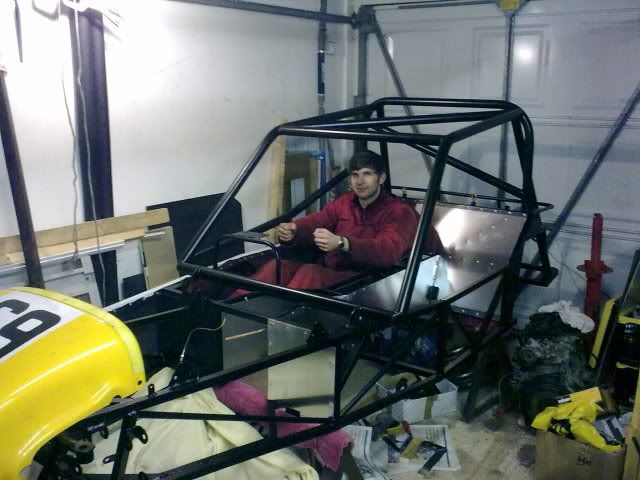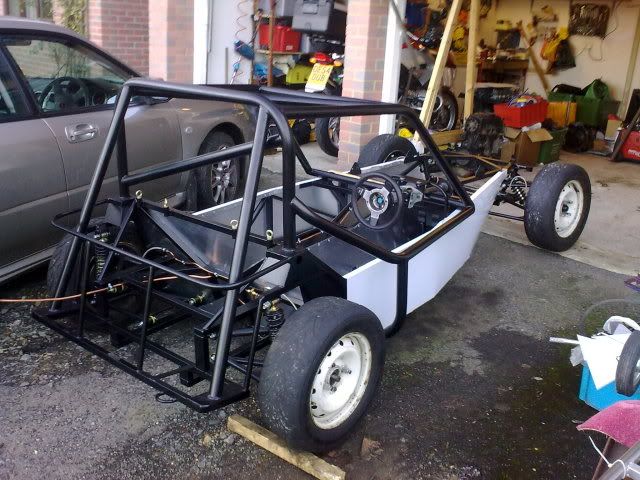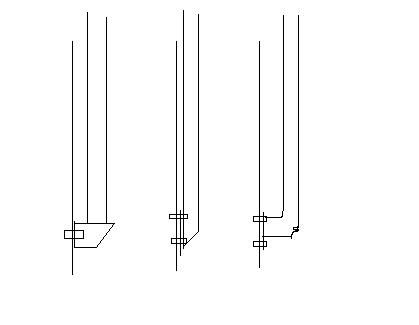Tatey
|
| posted on 20/2/10 at 05:38 PM |

|
|
MSA Compliant Roll Cage - Questions
I'm looking to get a MSA compliant roll cage installed in my Haynes Roadster (I have nearly finished the chassis so thought it would be best to
get it fully welded in now.
I'm after a roll cage with side impact bars. I've read through MSA blue book:
http://www.msauk.org/uploadedfiles/msa_forms/bluebooks/09/Competitors_Safety.pdf
But I have a few questions in regards to the roll cage i've designed around the book.
Are the side impact bars I have designed allowed? If not what are they supposed to be like? Can they be bent to form around the shape of the roadster,
to allowing getting in and out easier?
Can the roof bars have a bend in them?
Does the front roll bar have to come up to the same height as the rear roll bar to make a flat roof? Or can it be lower like I have designed?
Here is my unfinished proposed design (I am yet to put in the rear support stays and diagonal member):

|
|
|
|
|
AdrianH
|
| posted on 20/2/10 at 05:43 PM |

|
|
Hi Tatey;
Reading with interest. If/when I build the next one considering a track only car, so interesting on how you end up on this.
Discussed a little bit with Talon as well.
Also just a thought how about a cross piece at the front of the cage all the way across, say just under or over steering column, may help for side
impacts?
Adrian
p.s. check the 2010 blue book in case of any changes, I know it shows a few diagrams.
[Edited on 20-2-10 by AdrianH]
Why do I have to make the tools to finish the job? More time then money.
|
|
|
snakebelly
|
| posted on 20/2/10 at 05:57 PM |

|
|
are you planning to race in msa events? if so i thought that all roll cages had to be certified from this season onward? in which case i guess diy is
out
|
|
|
Tatey
|
| posted on 20/2/10 at 06:09 PM |

|
|
Snakebelly, do you happen to have any reference to that? I've had a quick look on Google but it's not bringing up much good
information.
I really hope you aren't right, as it would be a shame to stop DIY roll cages from entering race events.
If it is the case then I will be changing the design to be more athetically pleasing.
Adrian I think I will put a central bar across the front roll bar. I orginally didn't as in the regs it states that it must be as high as
possible, but the top edge lower than the top of the dash, and I couldnt think of any good places to put it, but after having a quick look at some
pictures I think it should be able to fit under the steering wheel.
|
|
|
jacko
|
| posted on 20/2/10 at 07:00 PM |

|
|
How about doing it like this photo taken of another web site but its some one of this site too i hope he does not mind
Jacko


[Edited on 20/2/10 by jacko]
|
|
|
minitici
|
| posted on 20/2/10 at 07:03 PM |

|
|
Roll cages do not need to be 'certified' so long as they are made from the correct materials and comply with the relevant drawings shown
in the MSA 'Blue Book' for the particular category for your vehicle.
The basic roll hoop with diagonal and rear stays is the minimum you require (provided that it meets a few dimensional requirements).
Any additional tubes (such as side protection are optional).
|
|
|
Tatey
|
| posted on 20/2/10 at 07:25 PM |

|
|
Cheers for that minitici. Thanks for the pictures jacko, however I dont think the design of running the roll bar through the dash and not fixing it to
the floor meets the MSA specs, as it needs to be mounting to 2 pieces of mild steel plate (at least 3mm thick) and of 120cm^2 area.
Random question here. But how is the passenger of the second car supposed to get in?  
|
|
|
Richard Quinn
|
| posted on 20/2/10 at 07:54 PM |

|
|
If that's an STM/Aries then the front cross bar attaches to steel plates welded in across the chassis under the scuttle. I don't think
that the Procomp one goes down to the floor either and I'm sure that has been tested by MIRA.
|
|
|
Richard Quinn
|
| posted on 20/2/10 at 07:56 PM |

|
|
quote:
Originally posted by Tatey
Random question here. But how is the passenger of the second car supposed to get in?  
I think that is the rear diagonal bar you are
looking at not a side bar.
|
|
|
jacko
|
| posted on 20/2/10 at 07:57 PM |

|
|
I believe its a hill climb race car the bar across the front goes in front of the scuttle holes are cut in the bonnet rear corners
|
|
|
dhutch
|
| posted on 20/2/10 at 08:29 PM |

|
|
quote:
Originally posted by Tatey... how is the passenger of the second car supposed to get in?  
quote:
Originally posted by
Richard QuinnI think that is the rear diagonal bar you are looking at not a side bar.
Exactly how i see it.
- In the second car, as far as i can see, theres no side impact protection.
This also highlights the only thought i had looking first at your cage, which is that you dont have a diagonal bar anywhere at the rear.
Daniel
|
|
|
jacko
|
| posted on 20/2/10 at 08:42 PM |

|
|
The two cars in my post are the same car
its a race car for hill climbing i belive
|
|
|
procomp
|
| posted on 20/2/10 at 08:50 PM |

|
|
Hi
The only roll cages that DO have to be certified are those that differ from tube dimensions and material used. And also different designs from those
as shown in the Blue book.
Mountings. The idea of bringing the front legs down inside the cockpit are not really a good as such. They will constantly be in the way of your outer
leg and when the G forces grow with speed you ll find that you will be constantly banging you leg against the upright. Hence you will see people then
putting padding on the upright that then moves your leg further inboard and makes it even more uncomfortable to operate the throttle. The
conventional way is to mount the tubes outboard. By welding sufficient mounting plates to the vertical chassis member and additional support you can
create a very strong area to mount too. What is to be avoided at all costs it simply bolting the cage upright through the chassis as Per CAGED do as
this dose not comply with the MSA/FIA regulations in any way at all and competitors have been turned away for using this method of mounting on some
events. The Stuart Taylor / Aries desighn is fully MSA/FIA compatible and with the tubing across the whole chassis at the front dose give a very
secure mounting arrangement and would use the whole cross section of chassis as a crush able structure in the event of a serious accident.
The only other ways such as how our procomp cages are mounted WILL require CERTIFICATION . This very expensive and not an easy procedure to go through
as dealings with the FIA can be tricky. Hence Our PROCOMP cage is the only cage fitted to a Seven type to have been through and passed the very
latest MSA/FIA testing.
Side intrusion bars are not actualy covered by the MSA?FIA regulations so there is no need to worry about bends and actual desighn regarding them But
they will have to be constructed using the same dimension material as is used for the rest of the main cage. Obviously common sense needs to be used
when doing a desighn for side intrusion. IE theres no point in having it so close to the main chassis that it provides no crush-able area as a saftey
gap. Also dont make the opening between the side bar and the top main bar big enough for a wheel to fit through.
Cheers Matt
|
|
|
Tatey
|
| posted on 20/2/10 at 10:02 PM |

|
|
Cheers for the advice everyone. I'll come back with a new design shortly.
The rear section of the car hasn't been created in CAD yet, as i couldnt be bothered  . However that is next on my list once I have the basics
of the roll cage sorted out. . However that is next on my list once I have the basics
of the roll cage sorted out.
Once the rear section of the car is sorted, i'll be putting in some rear roll bar supports, including a diagonal across them, as per the blue
book.
So for the next design I am thinking of putting in a horizontal brace for the front roll bar, making the side impact bars curve round the chassis, and
redesigning the front roll bar so that it doesn't intrude in cockpit.
It will all be getting made from 48mm OD CDS tubing, which I think is to MSA spec.
|
|
|
procomp
|
| posted on 20/2/10 at 10:08 PM |

|
|
Hi 45mm will be suficent for FIA/MSA regulations. anybigger is just over kill and heavy.
Cheers Matt
|
|
|
TimC
|
| posted on 20/2/10 at 11:14 PM |

|
|
Its 45mm x 2.5mm by the way - and CDS obviously.
One other point, it may be purely something that shows on the CAD drawing for techie reasons but the lengths of tube need to be continuous pieces bent
to suit and not bends welded to straights. I'm not making myself very clear but if you look at your drawing, the main rear hoop appears to be
five sections - it needs to be one.
|
|
|
Tatey
|
| posted on 21/2/10 at 11:05 AM |

|
|
Ah, didnt realise it could be 45 x 2.5 CDS.
Tim the pieces are just lengths bent to shape. The lines are just how Inventor shows the start and end of the bends.
Matt do you happen to have any examples of the exterior mounting method?
Also how large of a gap do you feel is appropriate for the side impact bar to action as a sufficient crush zone?
All of the this advice is defiantly being taken on board, I only really started reading about roll cages earlier on this week, so everyone's
experience and opinions are helping me.
[Edited on 21/2/10 by Tatey]
|
|
|
MikeR
|
| posted on 21/2/10 at 12:37 PM |

|
|
on my road going car i've welded in 3mm plate either side of the vertical tube in the chassis that scuttle comes up to furthest from the engine.
The 3mm plates are fully welded to the chassis and have a 10mm hole in them.
The plan is to then run a chassis leg along side this with a 3mm plate welded and gusseted to the roll bar and a 10mm hole in that. It will then have
4 mounting points on the chassis (two top chassis rail, two bottom chassis rail) approximately 12 inches apart and 4 or 5 inches width apart.
I haven't done anything special to the chassis apart from these mountings (eg extra gusseting) but keep thinking about it.
I'll then have the option of bolting the front hoop onto the car if i want to.
|
|
|
procomp
|
| posted on 22/2/10 at 10:06 AM |

|
|
Hi
As mentioned above by Mike. The best method is to plate up the Vertical at the base of the dashboard area and use 4 X 10mm bolts to attach the cage.
The Ideal distance for the side protection to stick out is. At the rear virtually as far out at the rear wing. But 200 mm from chassis side should be
sufficient as thats where the wheel is and that will take most of an impact there. Running foward to the front section where 150mm would be nice but
will depend on how it looks. The most important part is to get a J bar in from the side bar down to the base chassis tubes just in front of your hips.
This will need the base chassis having a cross tube across the whole floor and through the tunnel. Have a good look at some chassis shots on our
chassis.
Cheers Matt
|
|
|
alistairolsen
|
| posted on 22/2/10 at 10:20 AM |

|
|
Ok, so you have your 3mm plates for the mounting on the vertical, what shape do you make the ends of the cage feet?

hopefully thats clear enough?
My Build Thread
|
|
|
beaver34
|
| posted on 22/2/10 at 10:41 AM |

|
|
sorry to be a pain,
but how do i stand with mine as regards track days and competing? it was done by caged in 2004



|
|
|
MikeR
|
| posted on 22/2/10 at 08:38 PM |

|
|
quote:
Originally posted by alistairolsen
Ok, so you have your 3mm plates for the mounting on the vertical, what shape do you make the ends of the cage feet?

hopefully thats clear enough?
Mine will be the middle one BUT - you've got all 4 bolts at the bottom of hte leg. I've only got two bolts there & two bolts 12"
higher on the top chassis rail. This means the force that the front hoop can exert is spread out a little. The problem with the top mounting is that
the steel is floating in space a little - hence my comments about extra triangulation - perhaps something going forwards and inwards towards the
middle of the trans tunnel where its got the 1" tube at the top of the chassis height.
Matt - interesting comment about the 'J' tube. I may be retrofitting some steel now you've mentioned that.
|
|
|









